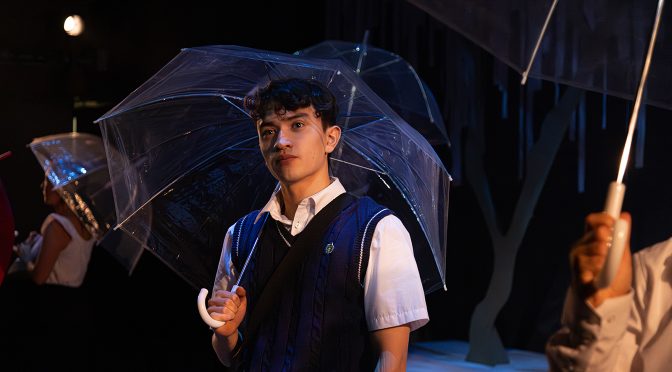At a guess, Susan Momoko Hingley and Alexandra Rutter’s adaptation of Makoto Shinkai’s anime suffers from being too enamoured of its source. If you don’t know the original novel or film, then the story, structure and characters are confusing on stage. While bringing the genre to the theatre is an interesting project, I fear this production is for fans only.
We follow two school pupils through snatched scenes. Takao wants to design shoes and plays truant to talk to an older woman in the park when it rains. Meanwhile, Shōko has an abusive relationship with a basketball player conducted entirely over the phone. It’s intriguing, if slow, and looks at plenty of teenage troubles. But the disjointed telling means too much time is taken working out the basics.
It’s impressive that two young leads manage to make the show watchable. Shoko Ito and Hiroki Berrecloth are engaging and ably supported by James Bradwell and Susan Momoko Hingley herself, who play the latter’s brother and mother respectively. All bring out a good deal of tenderness and humour when addressing their characters’ various insecurities and problems – but issues arrive out of the blue and lack subtlety.
The twist, that the women Takao is talking to, Yukari, turns out to be a teacher, is tough to believe. And Yukari’s actions seem oddest of all – drinking in the park while she’s supposed to be at work. The chronology means problems in the school are a puzzle. Aki Nakagawa’s beatific portrayal of her makes her problems pale. The theme of intergenerational friendship is lost.
Maybe it’s better to think about the show in terms of atmosphere. Here, Rutter’s work as a director is better. There are attempts to create a poetic air that reflects the characters’ isolation. The movement is good and the music from Mark Choi is excellent. But problems persist. Cindy Lin’s set ends up fussy, with benches moved around interminably. And the show does not sit well with venue’s thrust stage – in particular, projections of poetry are too brief and too small.
The tone of the piece changes after the interval – what’s going on becomes clearer. But there are still those questions about motivation. We’re told that “all humans are weird” more than once and we can see that’s true. But it isn’t obvious where the observation leads. Such puzzles about Takao’s and Shōko’s feelings might be fine if the production was engrossing, but it all feels pruned rather than profound.
Until 9 September 2023
Photos by Piers Foley

